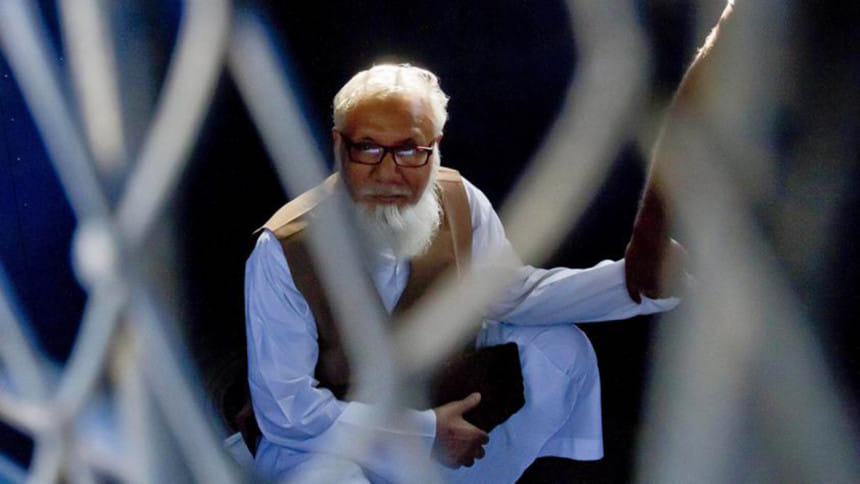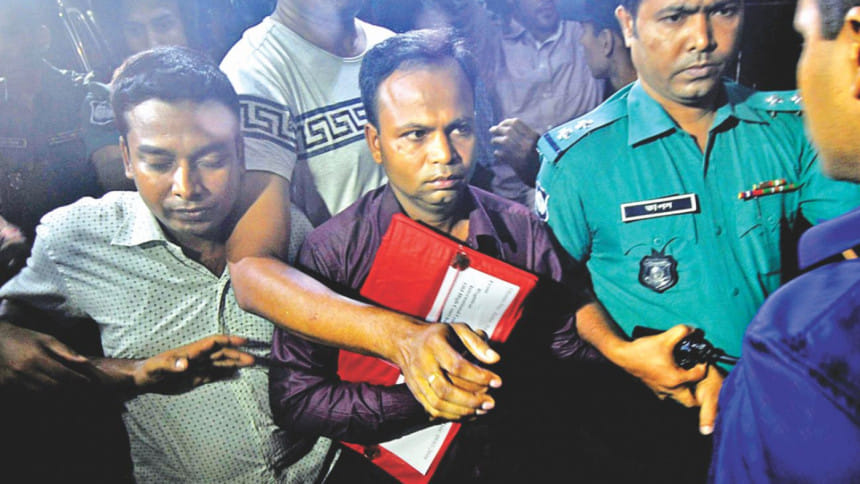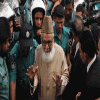Verdict read out to Nizami

The Dhaka Central Jail authorities last night received a copy of the Supreme Court judgment that confirmed the death penalty of war criminal Motiur Rahman Nizami, top leader of the infamous Al-Badr Bahini.
The verdict was read out to Jamaat-e-Islami ameer Nizami at a condemned cell in the prison around 8:00pm, Senior Jail Superintendent Jahangir Kabir told The Daily Star.
Attorney General Mahbubey Alam said the jail authorities would now ask the death row convict whether he would seek presidential clemency. They would give him a "reasonable time” to reply.
If he intends to ask for mercy, he has to submit an application to the president through the home ministry. The president, on the advice of the prime minister, would decide on the mercy prayer, said the country's top law officer.
If the president rejects the petition or if Nizami decides not to seek clemency, the government would decide on when it would execute the verdict, Mahbubey told The Daily Star last night.

Meanwhile, quoting Nizami's family members, one of his lawyers said his client wouldn't seek presidential mercy.
Tajul Islam, a counsel for the condemned war criminal, told this correspondent yesterday that Nizami's family members met him at Kashimpur Jail on May 6, and he told them he wouldn't seek clemency.
The Daily Star couldn't get any comment from Nizami's family on the issue.
Meanwhile, Home Minister Asaduzzaman Khan said they had received a copy of the SC verdict and would execute it on completion of necessary formalities.
Earlier in the afternoon, the SC released its full verdict that dismissed Nizami's petition for reviewing his death sentence handed down by the International Crimes Tribunal-1 in October 2014 for committing crimes against humanity in 1971.
The full text of the SC judgement reached the ICT around 5:10pm, and the tribunal then sent copies of the verdict to Dhaka Central Jail and the other authorities concerned.
"We have sent copies of the verdict to the jail authorities and the district magistrate in Dhaka at 6:45pm for taking necessary steps," ICT Registrar Shahidul Alam Jhinuk told this correspondent.
On Sunday night, Nizami was shifted to Dhaka Central Jail from Kashimpur prison in Gazipur amid tight security.
The ICT also sent a copy to the home ministry and the law ministry, he added.
Jail sources said a five member-team led by ICT Deputy Registrar Keshob Roy Chowdhury handed over a copy of the verdict to the senior jail superintendent around 7:00pm.
It cannot be said for sure how many days it would take for the authorities to complete the procedures for the execution of the verdict.
Previously, Jamaat leader Mohammad Kamaruzzaman was executed five days after the dismissal of his review plea while another Jamaat leader, Ali Ahsan Mohammad Mojaheed, and BNP leader Salauddin Quader Chowdhury were hanged three days after the apex court rejected their review petitions.
Nizami was the president of Jamaat's student wing Islami Chhatra Sangha from 1966 to September 1971 and ex-officio chief of Al-Badr.
He masterminded the formation of the militia that unleashed terror on peace-loving Bangalees, killed unarmed civilians, raped women and destroyed properties during the 1971 Liberation War.
Towards the end of the war, the Al-Badr Bahini committed “crimes of serious gravity intending to demean the human civilisation,” said the ICT-1 in its 2014 verdict.
Sensing Pakistan's imminent defeat, the notorious force systematically rounded up, tortured and killed the nation's brightest luminaries to intellectually cripple the soon-to-be independent Bangladesh.
But Nizami has never repented of the cold-blooded savagery.
Instead of getting punished for the heinous crimes, Nizami was rehabilitated after 1975. He gained immense political clout and even became a minister during the BNP-led government's tenure between 2001 and 2006.
But justice caught up with him in October 2014 when the ICT-1 sentenced him to death for war crimes, and the SC on January 6 this year upheld the death penalty.
Nizami filed a petition with the SC, seeking review of his conviction and sentences against him.
On May 5, a four-member SC bench headed by Chief Justice Surendra Kumar Sinha dismissed the review petition, paving the way for the execution of the verdict.
The three other judges of the bench are Justice Nazmun Ara Sultana, Justice Syed Mahmud Hossain and Justice Hasan Foez Siddique.
SC OBSERVATIONS
In its full verdict, the apex court said Nizami has “impliedly admitted” his involvement in the crimes against humanity in 1971.
It said Nizami has been found guilty on five charges, but he sought review of three charges on which he was given the death penalty.
“We would like to observe here that the petitioner [Nizami] has not taken any exception as regards his conviction and sentence with respect to charge Nos. 7 and 8, on which charges, he was also found guilty for his direct participation in the killing of Sohrab of Brishalikh and also instigating to kill Bodi, Rumi, Jewel and Azad at old MP Hostel, Nakhalpara.
“Therefore, the petitioner's involvement and complicity in the perpetration of offences of crimes against humanity and genocide have been impliedly admitted by the accused,” the apex court said.
“More so, in view of the submission of the learned counsel to commute the sentence, the petitioner cannot dispute his involvement in those offences,” it said.
Meanwhile, Human Rights Watch, a New York-based rights organisation, said the death sentence for Nizami should be suspended with immediate effect.
“Human Rights Watch opposes the death penalty in all circumstances as an irreversible, degrading, and cruel punishment,” Brad Adams, Asia director at HRW, said in a statement.
“It is particularly problematic when there are questions about whether proceedings meet fair trial standards,” he added.

 For all latest news, follow The Daily Star's Google News channel.
For all latest news, follow The Daily Star's Google News channel. 




Comments